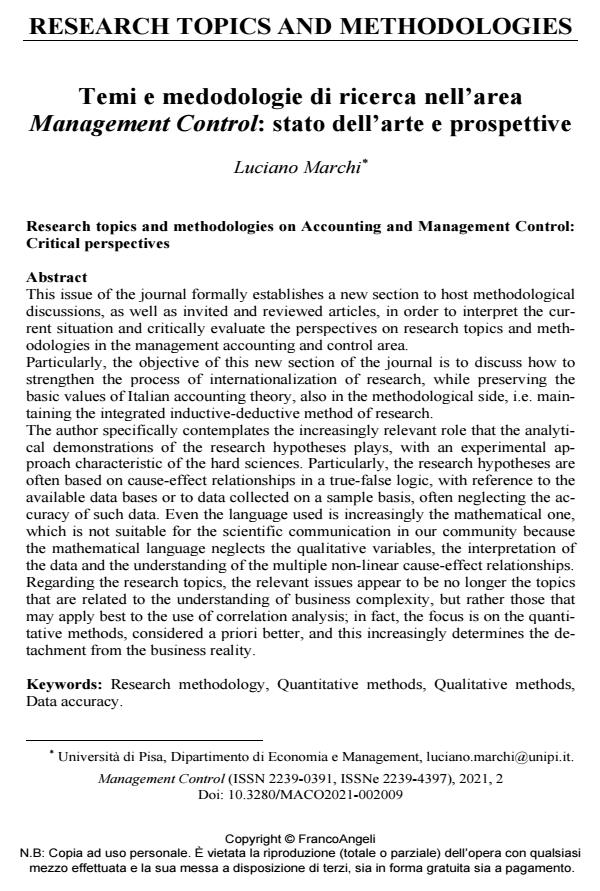Temi e medodologie di ricerca nell’area Management Control: stato dell’arte e prospettive
Titolo Rivista MANAGEMENT CONTROL
Autori/Curatori Luciano Marchi
Anno di pubblicazione 2021 Fascicolo 2021/2
Lingua Italiano Numero pagine 6 P. 165-170 Dimensione file 203 KB
DOI 10.3280/MACO2021-002009
Il DOI è il codice a barre della proprietà intellettuale: per saperne di più
clicca qui
Qui sotto puoi vedere in anteprima la prima pagina di questo articolo.
Se questo articolo ti interessa, lo puoi acquistare (e scaricare in formato pdf) seguendo le facili indicazioni per acquistare il download credit. Acquista Download Credits per scaricare questo Articolo in formato PDF

FrancoAngeli è membro della Publishers International Linking Association, Inc (PILA)associazione indipendente e non profit per facilitare (attraverso i servizi tecnologici implementati da CrossRef.org) l’accesso degli studiosi ai contenuti digitali nelle pubblicazioni professionali e scientifiche
This issue of the journal formally establishes a new section to host methodological discussions, as well as invited and reviewed articles, in order to interpret the current situation and critically evaluate the perspectives on research topics and methodol-ogies in the management accounting and control area. Particularly, the objective of this new section of the journal is to discuss how to strengthen the process of internationalization of research, while preserving the basic values of Italian accounting theory, also in the methodological side, i.e. maintaining the integrated inductive-deductive method of research. The author specifically contemplates the increasingly relevant role that the analyt-ical demonstrations of the research hypotheses plays, with an experimental ap-proach characteristic of the hard sciences. Particularly, the research hypotheses are often based on cause-effect relationships in a true-false logic, with reference to the available data bases or to data collected on a sample basis, often neglecting the accuracy of such data. Even the language used is increasingly the mathematical one, which is not suitable for the scientific communication in our community be-cause the mathematical language neglects the qualitative variables, the interpreta-tion of the data and the understanding of the multiple non-linear cause-effect relationships. Regarding the research topics, the relevant issues appear to be no longer the topics that are related to the understanding of business complexity, but rather those that may apply best to the use of correlation analysis; in fact, the focus is on the quan-titative methods, considered a priori better, and this increasingly determines the detachment from the business reality.
Parole chiave:Research methodology, Quantitative methods, Qualitative methods, Data accuracy.
- Andrei P. (2021), L’Economia Aziendale è ancora viva! (?), Torino, Giappichelli.
- Antonelli V. (2021), Le partizioni dell’Economia Aziendale: una prospettiva interpretativa, Torino, Giappichelli.
- Bromwich M., Scapens R. W. (2016), Management Accounting Research: 25 years on, Management Accounting Research, 31, pp. 1-9.
- Chiucchi M.S., Gatti M. (2020), Back to reality. Il gap tra teoria e prassi negli studi di controllo di gestione, Management Control, 1 suppl., pp. 5-10. DOI: 10.3280/MACO2020-001-S1001
- Fellingham J. C. (2007), Is Accounting anAcademic Discipline?, Accounting Horizons, 2, pp. 159-163.
- Giannessi E. (1979), Appunti di Economia Aziendale, Pisa, Pacini.
- Greco G. (2014), Una comparazione internazionale tra i sistemi di valutazione della ricerca scientifica, Management Control, 1, pp. 87-99. DOI: 10.3280/MACO2014-001006
- Invernizzi G. (2012), L’internazionalizzazione degli studi di Economia Aziendale: il ruolo delle riviste scientifiche nazionali, Rivista Italiana di Ragioneria e di Economia Aziendale.
- Malmi. T. (2016), Managerialist Studies in Management Accounting: 1990-2014, Management Accounting Research, 31, pp. 31-44.
- Mancini D. (2016), Accounting Information Systems in an Open Society. Emerging Trends and Issues, Management Control, 1, pp. 5-16. DOI: 10.3280/MACO2016-001001
- Marchi L. (2015), Nuove prospettive di ricerca sulle tematiche di Management Control, Management Control, 3, pp. 5-8. DOI: 10.3280/MACO2015-003001
- Nørreklit H. (2017), A Philosophy of Management Accounting: A Pragmatic Constructivist Approach, Taylor and Francis.
- Paolini A., Quagli A. (2013), Una riflessione sugli strumenti bibliometrici per la valutazione della ricerca e una proposta: il real impact factor, Management Control, 3, pp. 115-128. DOI: 10.3280/MACO2013-003007
- Rusconi G. (2014), La valutazione della ricerca scientifica. Alcuni spunti di riflessione dopo le recenti esperienze in Italia, Management Control, 1, pp. 73-85. DOI: 10.3280/MACO2014-001005
- Santini F. (2021), Gli “effetti indesiderati” dell’Accounting come “scienza”. Il ruolo della metodologia di ricerca nel Management Acconting and Control, Management Control, 2, pp. 169-196. DOI: 10.3280/MACO2021-002010
- Skoog M. (2020), Management Control Theory and Practice Integration: Challenges and Possibilities, Management Control, 1 suppl, pp. 11-18. DOI: 10.3280/MACO2020-001-S1002
- Mixed Methods in Business, Management and Accounting Research: An Experimental Design in the Entrepreneurship Domain Massimo Albanese, in European Journal of Interdisciplinary Studies /2022 pp.35
DOI: 10.26417/641eff87 - Management control in inter-firm relationships: Opportunities and challenges of blockchain technology adoption Giovanna Centorrino, Guido Noto, Daniela Rupo, in MANAGEMENT CONTROL 3/2022 pp.65
DOI: 10.3280/MACO2022-003004
Luciano Marchi, Temi e medodologie di ricerca nell’area Management Control: stato dell’arte e prospettive in "MANAGEMENT CONTROL" 2/2021, pp 165-170, DOI: 10.3280/MACO2021-002009